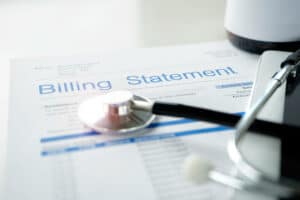Handling Medical Bills After Divorce in NJ
In Marriage, You Usually Aren’t Accountable for Your Partner’s Debt, But There Are Cases Where One Spouse Could Be Held Responsible for The Other’s Medical Bills
 The state of New Jersey does not have an official status for legal separation. This means that, until divorce, both spouses share ownership of marital assets and responsibility for marital debts. Marital debts are those incurred during the course of the marriage. A separated couple in New Jersey, in many cases, is still legally within a viable marriage. There are roundabout ways, however, for a couple to create financial and custodial separation while still within the technicality of marriage. One such way is a separation agreement. A separation agreement is a civil contract that outlines how marital assets, debts, custodial arrangements, spousal support payments, and shared expenses will be divided. This legally enforceable document generally includes a clause noting that individually-accrued debts will fall to the responsible party for handling, including new medical expenses. While a separation agreement provides a legal avenue for freedom from future shared financial responsibility, there are circumstances by which one may be responsible for medical expenses incurred after separation.
The state of New Jersey does not have an official status for legal separation. This means that, until divorce, both spouses share ownership of marital assets and responsibility for marital debts. Marital debts are those incurred during the course of the marriage. A separated couple in New Jersey, in many cases, is still legally within a viable marriage. There are roundabout ways, however, for a couple to create financial and custodial separation while still within the technicality of marriage. One such way is a separation agreement. A separation agreement is a civil contract that outlines how marital assets, debts, custodial arrangements, spousal support payments, and shared expenses will be divided. This legally enforceable document generally includes a clause noting that individually-accrued debts will fall to the responsible party for handling, including new medical expenses. While a separation agreement provides a legal avenue for freedom from future shared financial responsibility, there are circumstances by which one may be responsible for medical expenses incurred after separation.
When Can a Separated Spouse Be Responsible for Their Ex-Partner’s Medical Bills After Separation in NJ?
A spouse will be responsible for footing the bill of their ex’s medical expenses if they are proven to remain in a viable marriage. If a couple is separated, a creditor is responsible for proving that the marriage is still viable, and thus the ex-spouse is responsible for the expenses of the spouse who incurred the expense. Proving marital viability can be tough for a creditor.
Understanding a Viable Marriage
A viable marriage is one in which two separated parties remain somewhat physically or financially interdependent. The subsistence of the marriage itself in the eyes of New Jersey law does not make a marriage viable. As we learned in National Account Systems, Inc. v. Mercado, “proof of an undissolved marriage does not in itself provide the basis for liability to a creditor supplying a spouse with necessities.” There are many ways in which a couple can provide non-viability of marriage while still remaining legally married under NJ law. If a couple has signed a mutual separation agreement that outlines financial independence from the time of signing, a creditor will be unlikely to prove viability of the marriage. In a civil union, if the couple files a “divorce from bed and board” according to NJ Rev Stat § 2A:34-3 (2013), they will be liberated from joint financial obligations. However, if a couple is officially separated, but they still live in the same house and share financial interdependence and responsibilities, they could be proven in a viable marriage for the purposes of shared debt responsibility.
Medical Debt in the Context of Equitable Distribution in New Jersey

Importance of Determining Whether the Debt is Marital Property in NJ
Only marital property is subject to joint responsibility. This means that if a debt was incurred before the marriage, the spouse who incurred the debt is fully responsible for settling it before, during, and after the marriage. As such, it is essential to determine which debts – and, for that matter, which assets – are marital property and which are individual property.
Doubts About Hospital Bills After Divorce? Contact Our Knowledgeable Ocean NJ Divorce Lawyer
Divorces in New Jersey, especially those that constitute the legal gray area, such as separations, can lead to complex complications. Having an experienced family law attorney on your side can make all the difference. If you have been approached by your ex’s creditor pinning you with their debt incurred after separation, we at The Bronzino Law Firm can help you prove your legal freedom from financial responsibility. Contact us today at (732) 812-3102 to learn how we’ve similarly supported clients in Point Pleasant, Tinton Falls, Toms River, Bay Head, Barnegat, Belmar, Mantoloking, Middletown, Red Bank, Neptune, and other towns in Monmouth and Ocean County in completing their legal separation and avoiding costly complications down the road.







